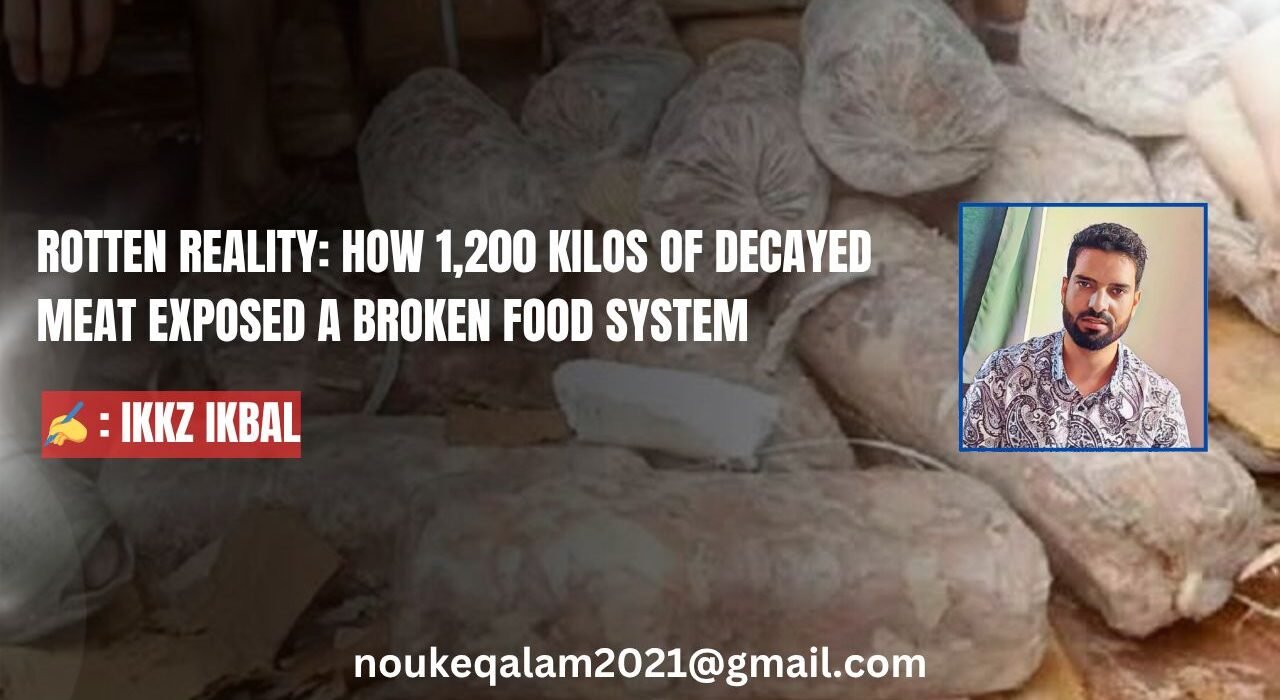By:. Ikkz Ikbal / Kupwara
It took 1,200 kilograms of visibly decayed, putrid meat to shake us out of our collective slumber.
Seized just days ago in Srinagar, this massive stockpile of spoiled animal flesh has unearthed more than just a public health threat — it has exposed the rotting conscience of an ecosystem that trades life for lucre. As more reports trickle in of suspicious consignments being intercepted across the Valley, the unease is no longer just about what was seized — it’s about what may already have slipped through unnoticed and landed on dinner plates across Kashmir.
That’s where the real horror begins.
What kind of society allows rotting meat to be carted into neighborhoods, marinated in deception, and possibly disguised as kebabs, burgers, or sausages?
The answer lies in a dangerous equation: when the pursuit of profit supersedes public good, the health of the masses becomes expendable.
Behind those 1,200 kilograms, there was a chain — suppliers who knew the meat was bad, middlemen who cut corners, and vendors who, perhaps out of desperation or greed, turned a blind eye. No single link can be blamed in isolation, yet all are part of a system that’s been allowed to operate with frightening opacity.
This wasn’t a mistake.
It was a calculated gamble on public ignorance.
The most damning question isn’t just about who sold the meat — but why it was allowed to circulate unchecked in the first place.
Where was the Food Safety Department when these truckloads crossed state borders?
Where were the routine inspections, the random sampling, the enforcement of meat market regulations?
Why does it always take a catastrophe — a viral video, a raid, or public outrage — for these bodies to act?
It should never have required 1,200 kilograms of rotting meat to prove that we need active, visible, and vigilant food safety enforcement in Kashmir. Yet here we are, facing the painful truth: systemic apathy is as dangerous as malicious intent.
In a culture where food is sacred — where guests are greeted with platters of wazwan, and where meat is not just a dish but an emotion — we’ve become dangerously blind in our trust.
The truth is, we rarely ask questions when we eat outside.
We don’t peek into kitchens.
We don’t question where the meat comes from.
We assume cleanliness.
We presume hygiene.
We take for granted that someone, somewhere, is ensuring our safety.
But this incident shatters that illusion.
It’s time to eat with our eyes open.
And that doesn’t just mean reading menus — it means knowing the source, the handling, the ethics, and the safety of what ends up on our plates.
Let’s pause for a moment and visualize this:
That same rotten meat — blackened with decay, crawling with bacteria — could’ve easily been minced, seasoned heavily, and served from a shiny food truck or a family-run eatery.
The stench, masked by spices.
The toxins, undetectable by tongue.
And the consumer? Unaware. Innocent.
Possibly a child.
Possibly a diabetic.
Possibly someone with no way of fighting off the bacterial onslaught that comes from consuming meat in such a condition.
The toxins in decayed meat can’t always be cooked away. Many are heat-resistant and life-threatening.
Diseases such as Salmonellosis, E. coli infection, Botulism, Listeria, and Foodborne Toxoplasmosis are all risks when such meat enters the food chain.
This isn’t just about indigestion.
This is about epidemic-level public risk — and we barely escaped one.
Kashmiris take immense pride in hospitality, in culinary richness, in community feasts.
But we must evolve that culture into one of accountability and health-consciousness.
- Vendors and butchers must be licensed, inspected, and held to non-negotiable standards.
- Meat markets need proper cold storage, waste disposal systems, and hygiene certifications.
- Consumers must learn to ask questions — and stop buying from places that don’t meet basic hygiene.
We must move from naïve consumption to informed choices.
Destroying 1,200 kg of meat was necessary — but it’s not enough.
We need arrests, legal cases, penalties, and lifetime bans on those who play Russian roulette with public health. We need educational campaigns across urban and rural Kashmir about safe food practices.
Let this not be a moment that trends and fades.
Let it be a watershed in how we look at food regulation, consumer rights, and moral accountability.
A Final Thought
The real meat of the matter isn’t what was found in godowns.
It’s what we now do with this knowledge.
Will we forget after a week?
Or will we demand better systems, make informed choices, and become watchdogs ourselves?
Because next time, it may not be 1,200 kilograms sitting in a dumpster.
It may already be inside our bodies — or worse, inside our children.
About the Author
Ikkz Ikbal is a columnist, educator, and founder of Rizq Revolution — a startup committed to safe and hygienic food for every household. He tweets @IkkzIkbal and can be contacted at ikkzikbal@gmail.com.






Kode Referal Binance
August 8, 2025I don’t think the title of your article matches the content lol. Just kidding, mainly because I had some doubts after reading the article.